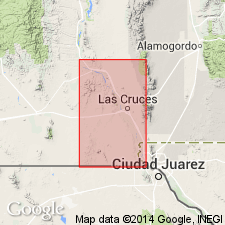
- Usage in publication:
-
- Bell Top formation
- Modifications:
-
- First used
- Dominant lithology:
-
- Pumice
- Rhyolite
- Tuff
- Sand
- Sandstone
- Gravel
- AAPG geologic province:
-
- Orogrande basin
Summary:
First published use of name. Intent to name not stated; no type locality designated. Crops out along the Rio Grande Valley, and in Dona Ana, Robledo, and Picacho Mountains, Dona Ana Co, NM, Orogrande basin. Overlies purple rhyolite breccia unconformably; overlain by Uvas basalt (new). Consists of pumice, soft pinkish rhyolite tuffs, vitrophyre flows and dikes, banded rhyolite flows and domes interbedded with light-colored pumiceous and tuffaceous sand and sandstone, and a few lenses of stream gravel, more than 800 ft thick. Near Hatch and in the northern foothills of Sierra de las Uvas, Bell Top formation is oldest rock exposed, and intertongues to northeast with Thurman formation in Rincon Hills and at Palm Park. Uvas basalt caps Bell Top formation southwest of Hatch, but near Palm Park similar flows are interbedded with upper strata of Thurman formation. Near Selden Canyon, Selden Hills, and Tonuco Mountains, light-colored tuffaceous conglomeratic sandstone about 210 ft thick is correlative with Bell Top formation, but to north near Caballo Mountains it thickens and is called Thurman formation. Shown on stratigraphic chart as Miocene age.
Source: GNU records (USGS DDS-6; Denver GNULEX).
For more information, please contact Nancy Stamm, Geologic Names Committee Secretary.
Asterisk (*) indicates published by U.S. Geological Survey authors.
"No current usage" (†) implies that a name has been abandoned or has fallen into disuse. Former usage and, if known, replacement name given in parentheses ( ).
Slash (/) indicates name conflicts with nomenclatural guidelines (CSN, 1933; ACSN, 1961, 1970; NACSN, 1983, 2005, 2021). May be explained within brackets ([ ]).

